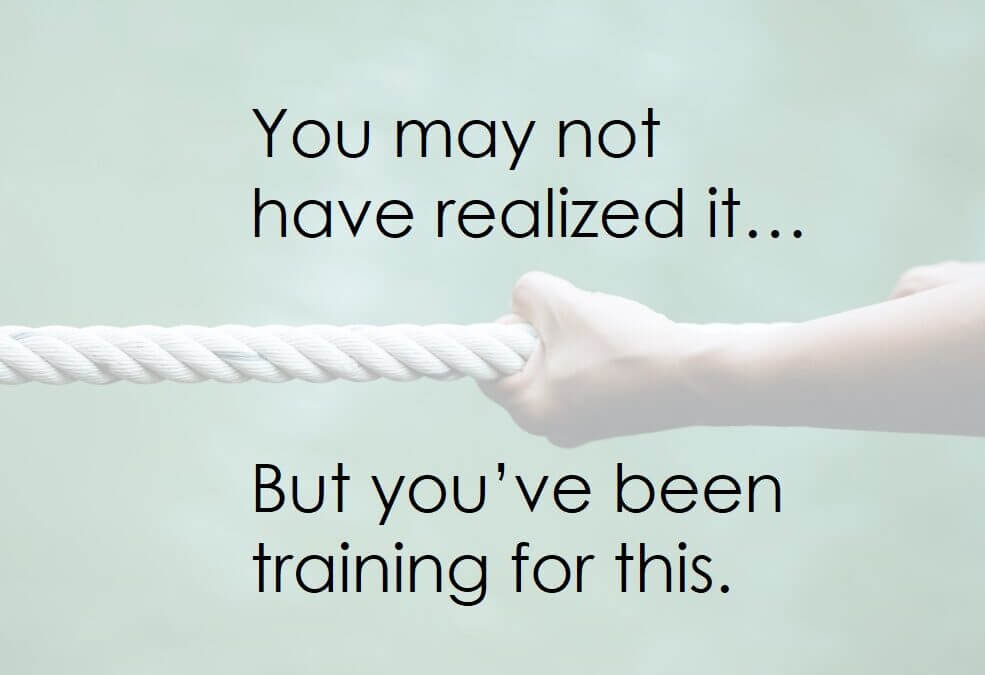
by Sara Ross | Mar 23, 2020 | COVID-19, Personal Leadership, Resilience
It’s the start of another week in the midst of COVID-19. I suspect it will feel different, but that doesn’t mean it will be any easier.
This might sound counter-intuitive, but I’d like to ask you to start by doing something difficult.
I ‘d like you to reflect on one of the hardest events in your life (outside of the current situation), where the outcome wasn’t what you wanted.
Knowing what you know now, and accepting that you can’t change the outcome, what would have helped you better cope with that situation?
Now, write down how can you apply that wisdom today.
In 2016, my mother died from breast cancer. When her cancer came back, it rapidly spread throughout her body. I spent the first couple of weeks obsessively trying to figure out how long she would live.
I felt that if I had this answer, I could make the best decisions around her comfort and treatment, when to notify family and friends, how much time I would need to take off work etc.
I believed that I could handle everything, if I just knew when my mothers death was coming.
I’ll give you one guess what my learning was?
I can’t predict, control, or force the future to unfold as I would like, not matter how hard I try.
I needed to increase my uncertainty tolerance and move on not knowing.
I needed to learn to make decisions on incomplete information.
I had to accept some decisions were right and some were wrong.
I had to learn to trust that I was doing my very best, with the resources I had in my most difficult moment.
I did get there, but I was overwhelmed, heartbroken and mentally, emotionally and physically drained by the time I got there.
Today, with my entire business future uncertain, I have experienced the same emotions. The good news is, I went through that phase much more quickly this time. I am more comfortable sitting with uncertainty and trusting myself.
Don’t get me wrong, I want answers about when the pandemic will end, I want certainty in what the world will look like, and I’d love to know I am making the right decisions at the moment…but I feel like I’ve been training for this.
I suspect you have as well!

by Sara Ross | Aug 8, 2019 | Resilience
A few years back I decided to take my
husband away for a surprise vacation. This was partly motivated by the flight
reward points I had been accumulating with my business travel. My hope was that
when redeemed, it would save us a bundle on the travel costs. Excitedly I
called the rewards companies customer service to arrange our free flights. However,
after a somewhat confusing and frustrating conversation, my hopes for free
flights were quickly deflated.
Mini Disappointments = Mega Opportunities. In the realm of disappointments, this was a mini one. The often-toted advice in this type of situation would be “shake it off” and “don’t give it another thought.” As common as this advice may be, its not very helpful. Ignoring the emotions of disappointment doesn’t make you better at handling them, nor does it strengthen your resilience for future ones.
Small disappointments are great opportunities to practice being disappointed. As counter-intuitive as this sounds, consider how often you feel frustrated or let down by misunderstandings. It would be unrealistic to expect to go through life without experiencing disappointment. How you handle these small disappointments can make a stark difference over time in how you react to the big ones. To build these skills it helps to understand the neurochemistry of disappointment.
Dopamine and Your Expectation Circuitry. Disappointment is directly connected to the neural transmitter, dopamine. Most know dopamine as a “reward” chemical. This is only partly correct. When it comes to disappointment Cambridge University Researcher, Dr. Wolfram Schutz studies suggest its role is less around achieving the reward but instead, more around the anticipated correctness of the reward.
Overlaying this science on my experience, it can be assumed that my brain anticipated getting a reward in the form of a free flight, causing my dopamine levels to surge. Once on the phone and it became apparent my reward was not going to be met, my dopamine levels fell, and the familiar pang of disappointment was experienced.
Here are three strategies to help
manage the neurological anticipation and handle the disappointment in a more
resilient way.
- Take a moment to feel the disappointment. Don’t try just to ignore the feeling or simply “brush them off.” Suppressed or ignored feelings do tend to build up over time making them harder to manage in the long run. Whether a big or small disappointment, acknowledge it. Research from Matt Lieberman out of UCLA used fMRI’s to show activity in the emotional system of the brain is lessened by recognizing and identifying the negative emotions being perceived. By admitting to yourself you feel disappointed, you dilute the intensity of the feeling. Interestingly, it is within the same emotional brain system that the nucleus accumbens is located which is responsible for the dopamine circuitry in the first place, which helps you manage your reactions at a neurochemical level.
- Keep disappointment in perspective with the ‘Rule of 10’. Your emotional brain is notorious for blowing
things out of proportion. One way to offset this response is to mentally put
parameters around your disappointment to keep it in perspective. Ask yourself,
will this have an impact in 10 minutes from now? 10 hours from now? 10 days, weeks,
months or years? The big ones need a lot
more of our mental and emotional resources, so keep the small disappointments within
realistic parameters.
- Don’t lose focus on what is good. You tend to experience loss more strongly than reward, even at a neural level (check out this great review in Scientific America). Without intentional action, you are prone to lose sight of the good or minimize the positive possibilities for the future. At the least, there is often an opportunity to learn something from disappointment, even if it means increasing our disappointment tolerance and strengthening your resilience with the strategies shared.
Unmanaged,
disappointment takes up a lot of mental real estate, energy, and enthusiasm
that is better spent in other ways. Resilience isn’t about not feeling emotion,
its about strengthening your ability to recover and learn from disappointment
and setbacks in a way that makes you stronger in the face of future challenges.
For
me, this was a small disappointment but a great opportunity to practice for the
next time without losing sight of the fact that we were very lucky to be going on
a vacation!


